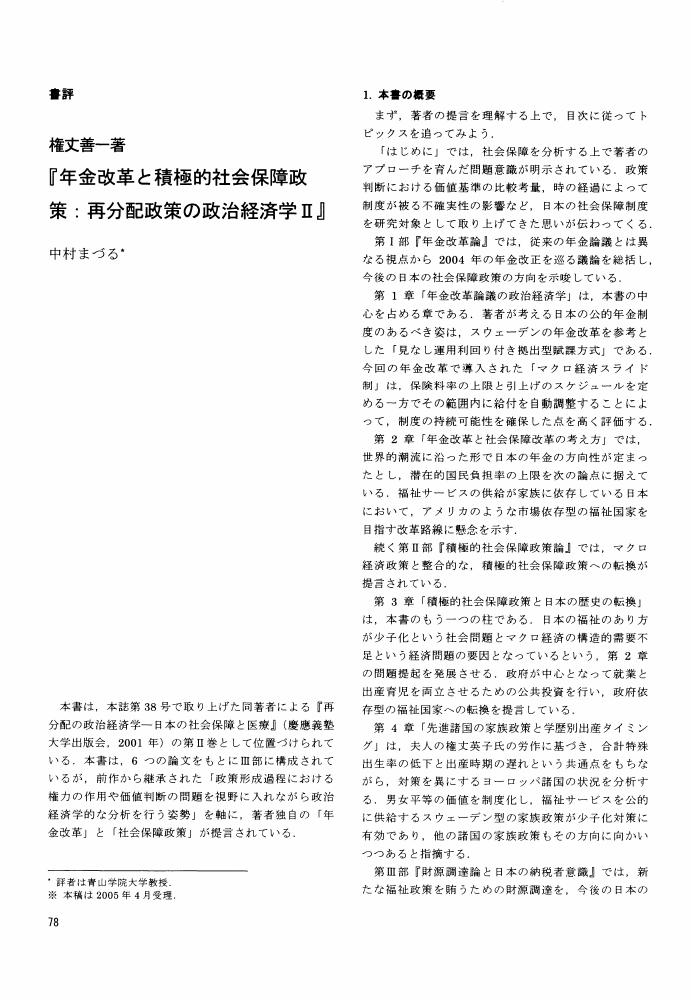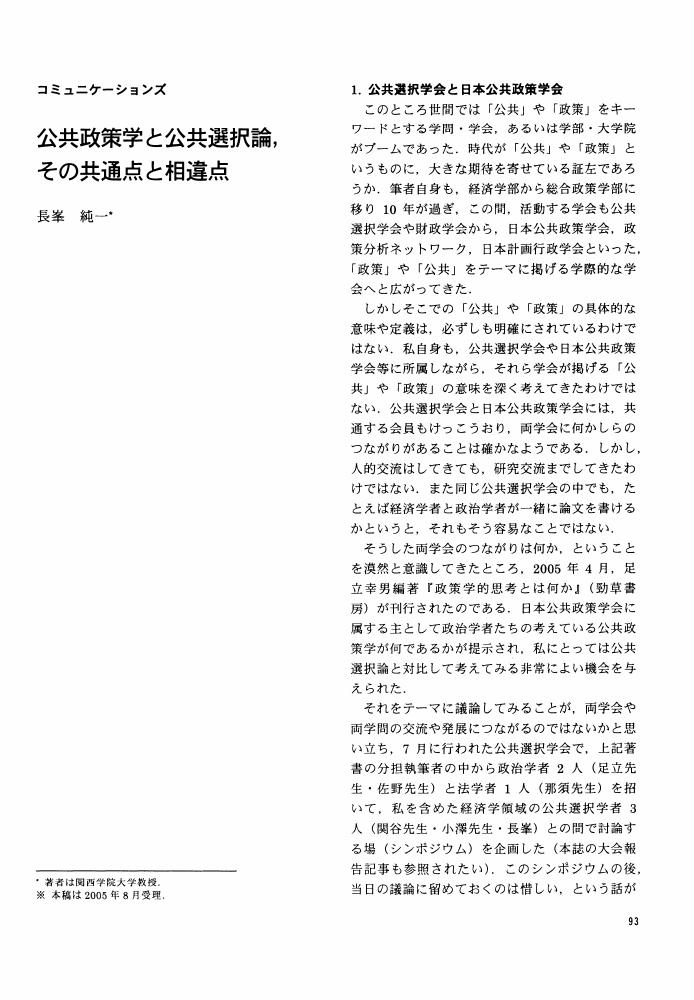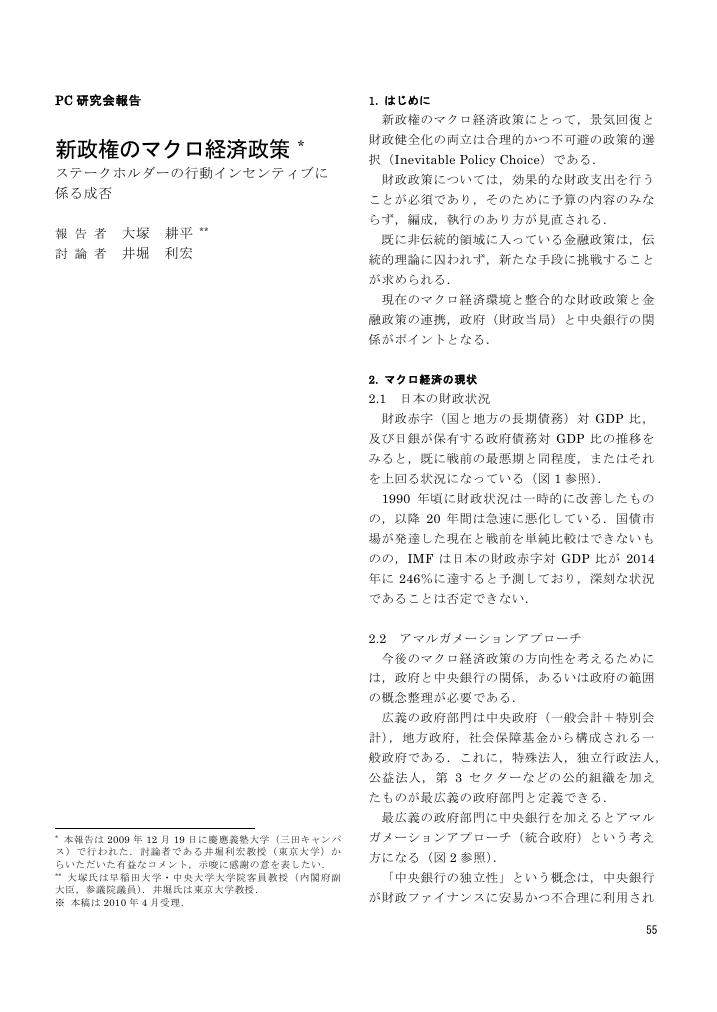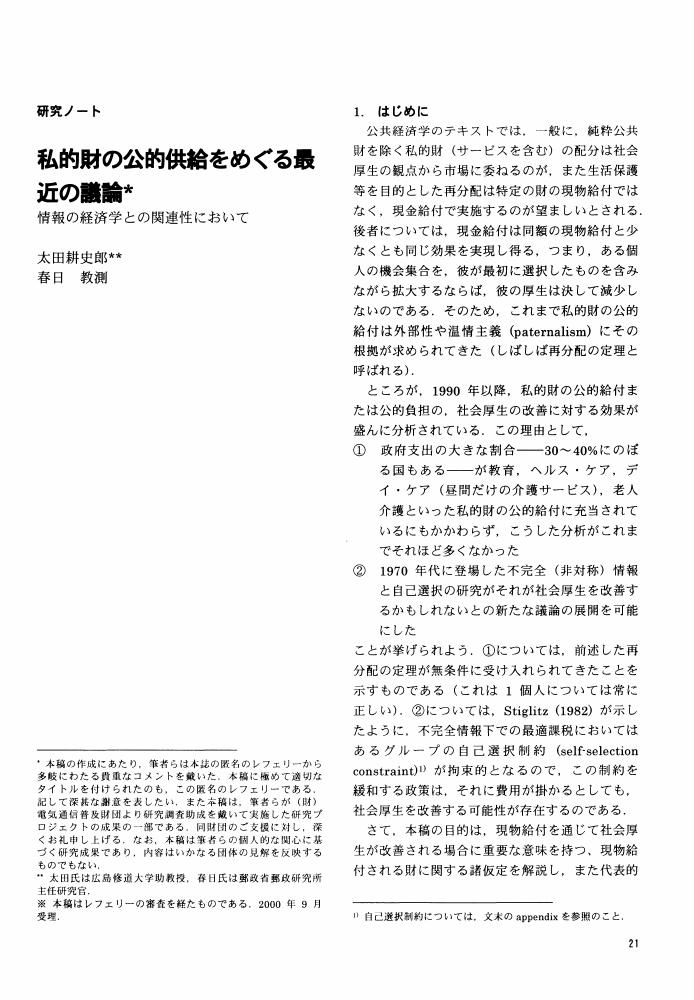2 0 0 0 OA 高等教育政策の転換と競争的資金供給
- 著者
- 川野辺 裕幸 前川 公志
- 出版者
- 公共選択学会
- 雑誌
- 公共選択の研究 (ISSN:02869624)
- 巻号頁・発行日
- vol.2005, no.45, pp.5-23, 2005-12-05 (Released:2010-10-14)
- 参考文献数
- 19
The Ministry of Education, Culture, Sports, Science and Technology launched“the 21st Century Center of Excellence (COE) Program”in fiscal year 2002. Right after the COE program, the Distinctive University Education Support Program (Good Practice [GP] ) started as an educational version of the COE program in fiscal year 2003, and the program expanded to various educational areas thereafter. Because of the overwhelming growth of demand for higher education services, the postwar Japanese higher education policy based mainly on the university chartering standard as an exante qualification of higher education. But since 1991 as the rapid reduction of 18 age population started, the Japanese higher education policy changed to a more competition and deregulation oriented ones. The ministry's new policy aims to bring about more vigorous competitive environment for the inter-university competition through national, public and private universities. Using the data of 499 universities which applied to the COE program and/ or the GP program, this paper examines the recent competition oriented policy using several numerical analyses. Some findings are as follows (1) the Japanese higher education policy which based mainly on the university chartering is found to be useful to assure the quality of research in national universities, (2) but which also brought forth the quality differ-entiation in research between the national, public and private universities, and the uniformity of education through these universities, (3) the GP programs which originally aimed at the improvement in the educational quality through the competitive subsidization, choose university programs whose quality of research are high.
2 0 0 0 OA 権丈善一著『年金改革と積極的社会保障政策: 再分配政策の政治経済学II』
- 著者
- 中村 まづる
- 出版者
- 公共選択学会
- 雑誌
- 公共選択の研究 (ISSN:02869624)
- 巻号頁・発行日
- vol.2005, no.44, pp.78-80, 2005-07-10 (Released:2010-10-14)
2 0 0 0 OA 公共政策学と公共選択論, その共通点と相違点
- 著者
- 長峯 純一
- 出版者
- 公共選択学会
- 雑誌
- 公共選択の研究 (ISSN:02869624)
- 巻号頁・発行日
- vol.2005, no.45, pp.93-97, 2005-12-05 (Released:2010-10-14)
- 参考文献数
- 4
2 0 0 0 OA いじめの経済分析 傍観者達のモデルと実験的検証
- 著者
- 柴田 愛子 森 徹 曽山 典子 岡村 誠
- 出版者
- 公共選択学会
- 雑誌
- 公共選択の研究 (ISSN:02869624)
- 巻号頁・発行日
- vol.2000, no.34, pp.43-59, 2000-06-25 (Released:2010-10-14)
- 参考文献数
- 18
Bullying in school is a serious problem in Japan as well as in most other countries. Bystanders rarely report instances of bullying to teachers, parents and other authorities. In this paper, we model bystander behavior by utilizing the theory of non-cooperative games, which assumes that bullying acts are stopped by a classroom teacher only when more than a certain number of students report the instances. Every bystander stands to gain from the resolution of bullying activity. But when a bystander reports this activity, she will have to deal with psychological and/or physical costs if the total number of reports falls below the required minimum. Under this structure of payoffs in our “bullying game” it can be shown that if all bystanders maximize their expected payoffs, there are two stable symmetric Nash equilibria. At one equilibrium, all bystanders report the instances of bullying to their teacher, and at the other equilibrium, no one reports. We conducted a series of experiments in which subjects played our “bullying game” under various values of parameters. The results of our experiments support the expected payoff-maximizing behavior of bystanders. Based on this verification of expected-payoff maximizing behavior through experiments, we develop guidelines for policies which could serve to increase reporting activity of bystanders and dissolve bullying activity. These include reducing the threshold number for reporting from students, increasing the disutility of students' observing bullying behavior, mitigating the psychological and/or physical costs for the reporting of bullying, and scale down of class size. The effectiveness of each policy is then analyzed theoretically and compared with the other alternatives.
2 0 0 0 OA 新政権のマクロ経済政策 ステークホルダーの行動インセンティブに係る成否
- 著者
- 大塚 耕平
- 出版者
- 公共選択学会
- 雑誌
- 公共選択の研究 (ISSN:02869624)
- 巻号頁・発行日
- vol.2010, no.54, pp.55-60, 2010-08-15 (Released:2013-07-31)
- 参考文献数
- 5
2 0 0 0 OA レジ袋削減政策の公共選択分析
- 著者
- 熊浦 崇将
- 出版者
- 公共選択学会
- 雑誌
- 公共選択 (ISSN:21872953)
- 巻号頁・発行日
- vol.2013, no.59, pp.5-25, 2013 (Released:2020-05-03)
- 参考文献数
- 20
Focus on the problem of selecting policy approaches to the theme of plastic shopping bag reduction policies have been carried out in the world, what reduction techniques that either are chosen, the advantages and disadvantages of each economic entity for each reduction techniques I was carried out on its preference ranking shown. Thereby, in the decision-making process actually must consider the advantages and disadvantages that must continue to solve for the distribution problem different from efficiency became clear. And voluntary agreements that have been adopted in the plastic shopping bag reduction policy in Japan got the conclusion that can serve as an effective complementary method to solve these problems.
2 0 0 0 OA 契約主義、立憲主義および自由主義
- 著者
- 谷口 洋志
- 出版者
- 公共選択学会
- 雑誌
- 公共選択の研究 (ISSN:02869624)
- 巻号頁・発行日
- vol.1987, no.9, pp.46-54, 1987-05-20 (Released:2010-10-14)
- 参考文献数
- 18
In his book The Limits of Liberty, Professor Buchanan argued that the state has two roles, that is, “protective” and “productive” ones, which are derived from the viewpoint of gains-from-trade among individuals. The purpose of this paper is to elucidate the characteristics of his view of the state described in this book and his essays.Professor Buchanan's theory of the state is characterized by (methodological) individualism, contractarianism, constitutionalism, libertarianism, subjectivism and democracy. All these elements are important and closedly linked each other. It should be emphasized, however, that contractarianism and constitutionalism, along with individualism, are specially important elements. And it should be pointed out that his libertarianism substantially means the constitutionalist-contractarian position based on individualism. Indeed, his own peculiar libertarianism distinguishes him from the libertarian anarchists, Hayek, Rawls and others. In this paper, we consider the difference between these modern thinkers and Buchanan in more detail.
- 著者
- 曽我 謙悟
- 出版者
- 公共選択学会
- 雑誌
- 公共選択の研究 (ISSN:02869624)
- 巻号頁・発行日
- vol.2005, no.45, pp.106-109, 2005-12-05 (Released:2010-10-14)
2 0 0 0 OA SchellingのkとESS
- 著者
- 金子 太郎
- 出版者
- 公共選択学会
- 雑誌
- 公共選択の研究 (ISSN:02869624)
- 巻号頁・発行日
- vol.1995, no.26, pp.68-78, 1996-01-30 (Released:2010-10-14)
- 参考文献数
- 10
This paper is concerned withN-person Prisoners' Dilemma in which every player has a dominant strategyd (defecting) but if every player uses his dominant strategy the outcome is Pareto-inferior.T. Schelling (1973) brought to attention the minimum size of any coalition that can gain by abstaining fromdin his definition ofN-person Prisoners' Dilemma and called this sizek. And he argued thatkplayers can be better off by abstaining from d, so they will cooperate.M. Taylor (1987) criticized Schelling fo having removed the“dilemma”in the Prisoners' Dilemma and left open the question of whether the sizekinfluences a player's incerrtive to cooperate.Cankinfluence a player's incentive to cooperate?In pure strategykcannot influence a player's incentive. Becausedis a dominant strategy.P. Molander (1992), on the other hand, showed in his theorem that the mixed strategy, consisting of both conditional cooperation influenced bykand unconditional defection, is Evolutionarily Stable Strategy (Maynard Smith (1974) ) in a dynamic model.I show his theorem in a simplified model and make clear the role of Schelling'skin the process of reaching the equilibrium.The results is as follows:(1) Schelling's k influences a player's incentive to cooperate in mixed strategy and to take strategy containing cooperation is rational from the standpoint of payoff maximization.(2) The equilibrium reached by the mixed strategies has robustness in that it resists invasion from other strategies.This can be an answer to the open question that M. Taylor proposed.
2 0 0 0 OA 連合政権の財政政策
- 著者
- 山下 耕治
- 出版者
- 公共選択学会
- 雑誌
- 公共選択の研究 (ISSN:02869624)
- 巻号頁・発行日
- vol.2001, no.37, pp.25-33, 2001-12-15 (Released:2010-10-14)
- 参考文献数
- 14
2 0 0 0 OA 合理的踏襲仮説の検証; 国・県・政令市・市町村・特別区比較
- 著者
- 黒川 和美
- 出版者
- 公共選択学会
- 雑誌
- 公共選択の研究 (ISSN:02869624)
- 巻号頁・発行日
- vol.2001, no.36, pp.47-58, 2001-07-05 (Released:2010-10-14)
- 参考文献数
- 14
1 0 0 0 OA 加藤寛先生を偲んで 制度改革の政治経済学
- 著者
- 中村 まづる
- 出版者
- 公共選択学会
- 雑誌
- 公共選択 (ISSN:21872953)
- 巻号頁・発行日
- vol.2013, no.60, pp.5-7, 2013 (Released:2020-05-03)
1 0 0 0 OA 政治理論における数理モデル分析: 多様性が能力に勝る定理をめぐる論争を題材として
- 著者
- 坂井 亮太
- 出版者
- 公共選択学会
- 雑誌
- 公共選択 (ISSN:21872953)
- 巻号頁・発行日
- vol.2022, no.77, pp.42-61, 2022 (Released:2023-03-29)
- 参考文献数
- 42
Recent epistemic democracy research on political theory has focused on the epistemic effectiveness of the democratic decision-making process, by which the collective intelligence derived is intended to find correct answers. The methodological characteristic of epistemic democracy is that it uses mathematical model analysis as the basis for its normative argument. The problem is that controversy has surrounded the implications of mathematical models built using ideal and normative democratic conditions for real-world political issues. The current research presented this problem by introducing the controversy over the "diversity trumps ability" theorem, a collective intelligence model in deliberation. It developed two approaches to alleviating the problem via the theory of epistemic democracy: One is to enhance the internal validity of a model and prepare the necessary conditions for ensuring its external validity through the robustness analysis of mathematical models within the scope of model analysis. The other is to go beyond model analysis to investigate the behaviors of mathematical models in an experimental system and accumulate results as a "library of phenomena." These proposals enable explorations into the range at which model analysis is generalizable to the real world while maintaining the normative nature of political theory.
1 0 0 0 OA 厚生経済学の基本定理と公共選択 パレート最適とブキャナン最適
- 著者
- 田中 清和
- 出版者
- 公共選択学会
- 雑誌
- 公共選択の研究 (ISSN:02869624)
- 巻号頁・発行日
- vol.1982, no.2, pp.25-30, 1982-12-10 (Released:2010-10-14)
- 参考文献数
- 13
This paper deals with the well known Basic Theorems of Welfare Economics from a view of Public Choice. The conventional Pareto Optimality of the Basic Theorems is defined by the only obligatory conditions. The changes from a society with no facultative conditions to that with both facultative and obligatory conditions are considered under the Theorems. But any changes except those from the existing rules and institutions are impossible in the real world. The First Basic Theorem is criticized from Buchanan's approach and the Second One is disapproved by allowing for Tullock's cost of transfers.The extention of the conventional Pareto Optimality concept to the changes of rules and institutions are called as Buchanan Optimality. We consider some charactaristics of Buchanan Optimality and Public Choice approach compared to the conventional Pareto Optimality criterion.
1 0 0 0 OA 新公共経営 (New Public Management) と公共選択
- 著者
- 玉村 雅敏
- 出版者
- 公共選択学会
- 雑誌
- 公共選択の研究 (ISSN:02869624)
- 巻号頁・発行日
- vol.1998, no.31, pp.61-72, 1998-12-15 (Released:2010-10-14)
- 参考文献数
- 40
- 著者
- 福井 秀樹
- 出版者
- 公共選択学会
- 雑誌
- 公共選択 (ISSN:21872953)
- 巻号頁・発行日
- vol.2022, no.77, pp.89-113, 2022 (Released:2023-03-29)
- 参考文献数
- 19
This paper investigates the effectiveness of matching techniques in improving covariate balance and reducing bias in estimating the effects of treatment through Monte Carlo simulation analysis. The results suggest that Propensity score matching (PSM), Mahalanobis distance matching (MDM), and Coarsened exact matching (CEM) are all effective in improving covariate balance, and that the "PSM paradox" pointed out by King and Nielsen (2019) is not observed in the relationship between the number of pruned observations and covariate balance. Rather, the results suggest that regardless of the matching method, improving covariate balance may lead to a paradoxical situation: beyond a certain point, the improvement of covariate balance no longer contributes to reducing bias in estimated effects of treatment. Also suggested is that even though the matching techniques cannot adjust for the bias of excluded variables and unmeasured confounders, when both are present, estimation after matching may reduce bias in estimated treatment effects better than OLS without matching.
1 0 0 0 OA 自然独占企業に対するインセンティブ規制のサーベイ
- 著者
- 土門 晃二
- 出版者
- 公共選択学会
- 雑誌
- 公共選択の研究 (ISSN:02869624)
- 巻号頁・発行日
- vol.1993, no.21, pp.61-69, 1993-05-25 (Released:2010-10-14)
- 参考文献数
- 20
1 0 0 0 OA デュベルジェ法則の実証的検証*
- 著者
- 西川 雅史
- 出版者
- 公共選択学会
- 雑誌
- 公共選択の研究 (ISSN:02869624)
- 巻号頁・発行日
- vol.2002, no.38, pp.19-30, 2002-07-15 (Released:2010-10-14)
- 参考文献数
- 23
The main purpose of this paper is to scrutinize the Duverger's Law. We especially shed light on (1) Duvergerian convergence process as a mechanism that makes the number of prim candidates converges to the stable value, and (2) whereabouts its stable value goes.In the first section Duverger's law is formalized for applying it to OLS estimation. In the second section, it empirically analyzed it by using single member district (SMD) data of Japan 1996 and 2000. The conclusion can be summarized to the following three points. (I) As long as the number of prime candidate is more than 2, Duvergerian slide down convergence works. However when it was smaller than 2, statistically significant conclusion was not obtained. Therefore, (II) the Duverger's Law in a classic meaning is untenable. In addition, (III) some of results statistically reject the hypothesis assumed that Duvergerian equilibrium is equal to 2 in SMD. According to these results, Duvergerian slide down convergence is tenable while the Duvergerian equilibrium departs from 2.
1 0 0 0 OA 道路政策のあり方と適切な制度設計
- 著者
- 太田 和博
- 出版者
- 公共選択学会
- 雑誌
- 公共選択 (ISSN:21872953)
- 巻号頁・発行日
- vol.2013, no.60, pp.99-121, 2013 (Released:2020-05-03)
- 参考文献数
- 10
To the public, highways and roads are the most familiar public utility. Therefore, every people have their own opinions and complain against highway and road administration. The public and the groups, for instance trucking industries and automobile manufacturers, have strong interests in highway and road policy, and infl uence its decision-making processes. During the last decade, Japan has experienced several failures in the highway and road policy-making. This paper picks up three policy topics such as the privatization of the Japan Highway Public Corporation, the transfer of automobile related taxes from the earmarked expenditure for highways and roads to the general account, and the change of the metropolitan expressway toll structure from a fl at fare system to a kilometer-based fare one. These three cases indicate that the decision-making process of the highway and road policy cannot result in optimal situations. For more appropriate highway and road policy, this paper proposes introducing constitutional rules into decision-making processes for the highway and road policy in Japan.









